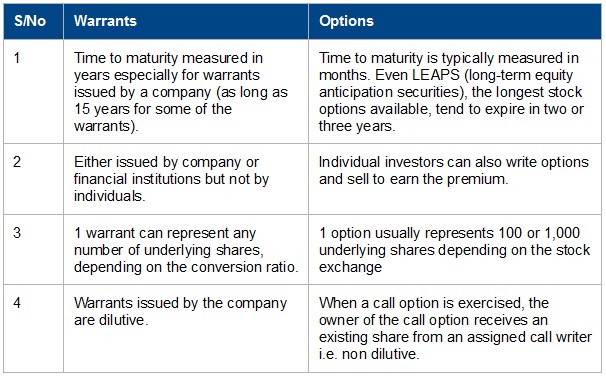Investing In Stock Rights And Warrants_1
Post on: 10 Июнь, 2015 No Comment

Contents
italic text’italic text bold textitalic text bold text’bold text’ bold text’bold text’ bold text
Warrants are a type of security that gives the holder the right to purchase (or sell) another security from (or to) the company that issued the warrant at a set strike price on or before the expiration of the warrant. The most common type of warrant is a stock warrant, which gives the holder the right to purchase or sell a set number of shares of the company.
A warrant is similar to an option in that both give the holder the right (but not an obligation) to purchase/sell a given security at a given strike price before its expiration. Like options. there are different exercise types associated with warrants such as American style (holder can exercise anytime before expiration) or European style (holder can only exercise on expiration date). Warrants are also broken down into call warrants. which give the holder the right to purchase an underlying security, and put warrants. which give the holder the right to sell the underlying security.
Warrants are rarely issued by themselves; normally they are issued in conjunction with another security. For instance, call warrants are typically issued with a bond issuance to make the offering more attractive. The idea is that the issuing company can pay a lower yield on the bonds by offering warrants as part of the package. In most cases, these warrants can be separated, or detached from the bond and sold in secondary markets. Rather than issuing warrants explicitly, companies can also issue warrants indirectly, in which case the term warrants are never even mentioned. For example, convertible bonds. bonds in which the maturity payment can be exchanged for a set number shares of stock. are an indirect form of warrants.
How do warrants work?
Warrants have a buyer, who pays an issuer the warrant premium (price of the warrant) in exchange for the right to purchase/sell a set amount of stock at the strike price. The terms of the contract, including strike price, expiration date, as well as any restrictions are agreed upon beforehand. If/when the warrant is exercised, the buyer presents the warrant and delivers the strike price (for calls) or the stock (for puts) to the issuer. The issuer then issues the agreed upon number of shares (for calls) or delivers the strike price (for puts) to the buyer.
Call warrants work almost identically to call options. with the exception being that when exercised, the issuer issues stock to the buyer rather than delivering existing shares of stock, which increases the total number of shares outstanding. Put warrants have the opposite effect; when they are exercised, the total number of shares outstanding is reduced. Companies that make heavy use of employee stock options often repurchase their own shares so total shares outstanding remains unchanged, and issuing put warrants is a way to hedge against the cost of repurchasing shares.
Differences between warrants and call options
In many aspects, the differences between warrants and call options are nearly indistinguishable; however, there are a number of differences that separate warrants from call options.
- Warrants are issued by the corporation on their own stock, whereas call options are typically issued by third parties such as option exchanges. For instance, if Goldman Sachs Group (GS) issues securities allowing the buyer to purchase stock of GS at $50, it would be considered a warrant. However, if Morgan Stanley (MS) issues securities allowing the buyer to purchase stock of GS at $50, it would be considered a call option.
- Because the warrant is issued by the company itself, exercise is dilutive to other shareholders. When a warrant is exercised, the company issues a new share of stock to the warrant holder and receives the strike price. This is in contrast to call options, in which existing shares are merely transferred between parties when exercised. Since warrants will never be exercised unless the spot price is higher than the strike price. the issuing company has essentially sold a share of the company for less than its actual worth when warrants are exercised. This increases the total number of shares outstanding.
- Warrants are considered a form of over the counter (OTC) derivative. meaning they are not exchange traded. As such, they can be customized by the company to fit their needs. This is a contrast from most call options, which are exchange traded and standardized.
- The lifetime of warrants are typically much longer dated than call options, meaning their expiration dates are often years after the issue date, whereas call options typically expire within a year.

What are the uses of warrants?
For investors, the uses of warrants are very similar to put and call options. Parties interested in investing in warrants include speculators looking to make bets on stock price movements as well as hedgers. In exchange for an up front cost, also known as the warrant premium, the buyer of a call warrant can profit on large upward movements in stock prices while limiting their downside. The maximum the buyer of a warrant can ever lose is the warrant premium (the price of a warrant). Theoretically however, the upside to a call warrant is infinite.
A quick example: You pay $5 to buy a European call warrant entitling you to purchase one share of Company Z (current share price $90) at a strike price of $100 in exactly one year. At the end of one year:
- If the stock price is at $50, your warrant expires worthless and you lose $5. Compare this to actually buying the stock, in which your loss would have been $40.
- If the stock price is $150, you exercise the warrant, paying the $100 strike price in return for one share of Company Z, in which your total gain would be $45. Compare this to actually buying the stock, in which your gain would have been $60.
Valuation
The fair price of warrants can be estimated by plugging in variables such as stock price, strike price, time until expiration, volatility. and interest rates into the Black Scholes Pricing Model. However, at expiration, call warrants only have value if the strike price is higher (for puts, lower) than the spot price. In this sense, only warrants with realistic strike prices have reasonable value. For example, if Company Z stock is trading today at $1, a call warrant with strike price $500 and expiration in 1 month will have virtually no value, since it is unrealistic to expect the stock price to rise above $500 in a single month.














